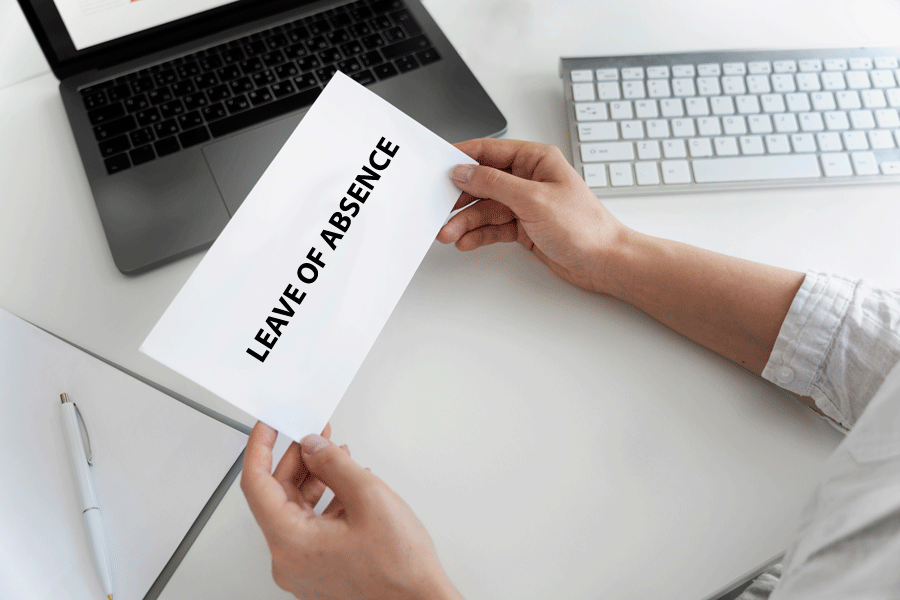Asking for a raise in your pay is a challenging request, though a necessary one if you think you deserve the pay raise. To get a positive reply to your plea for this purpose, write a well-crafted salary increase letter. The ideal letter drafted for this purpose will help you yield a better result. This letter allows you to give your employer reasons to get a raise without showing nervousness.
If you are unsure how to approach your boss on this matter or can’t come up with enough reasons to make a move, this article will guide you through all the steps and requirements to write a perfect letter.
Download Templates
Here is a collection of free templates that you can use to write these letters. These letters have been prepared with great care in a way that presents you as professional as well as persuasive. You can download them instantly.
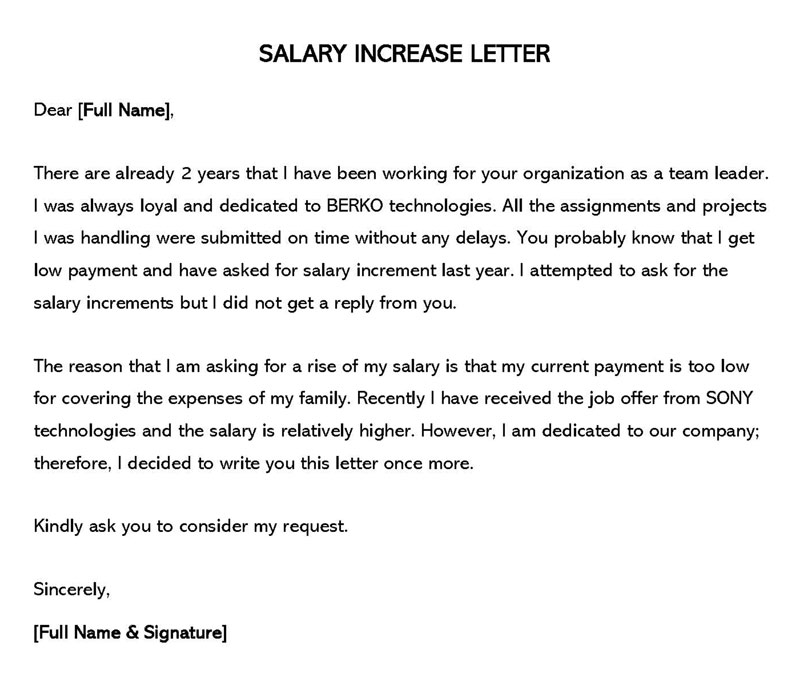
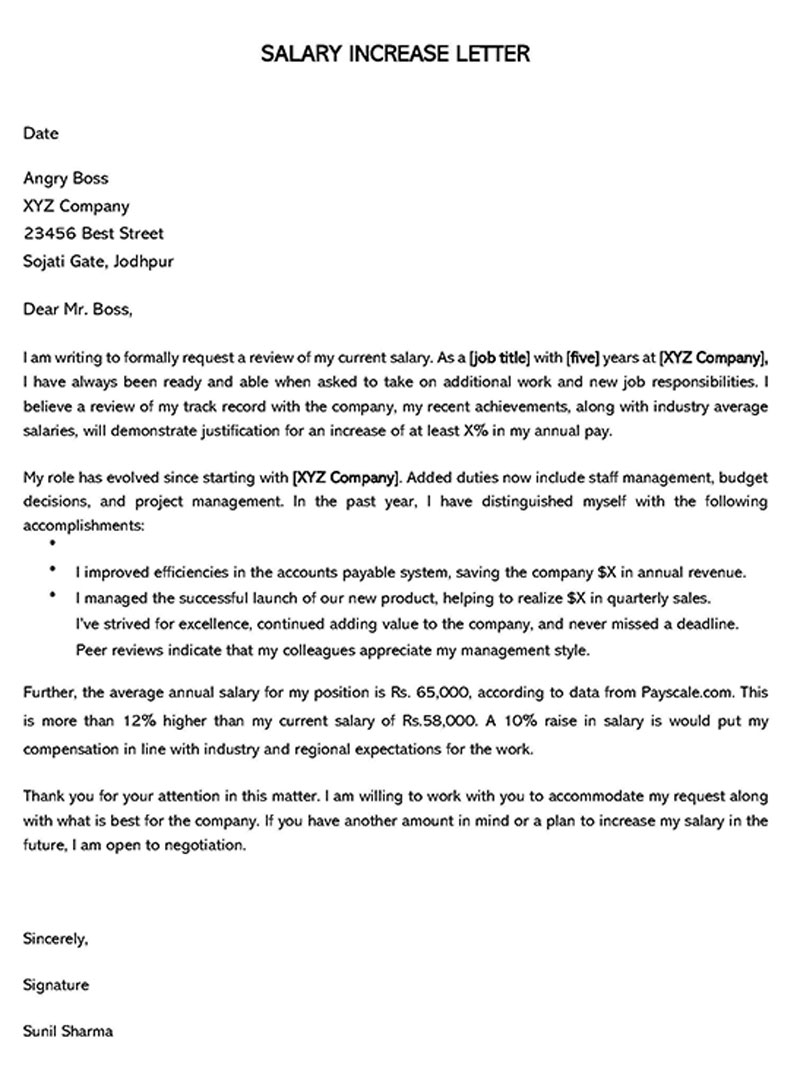
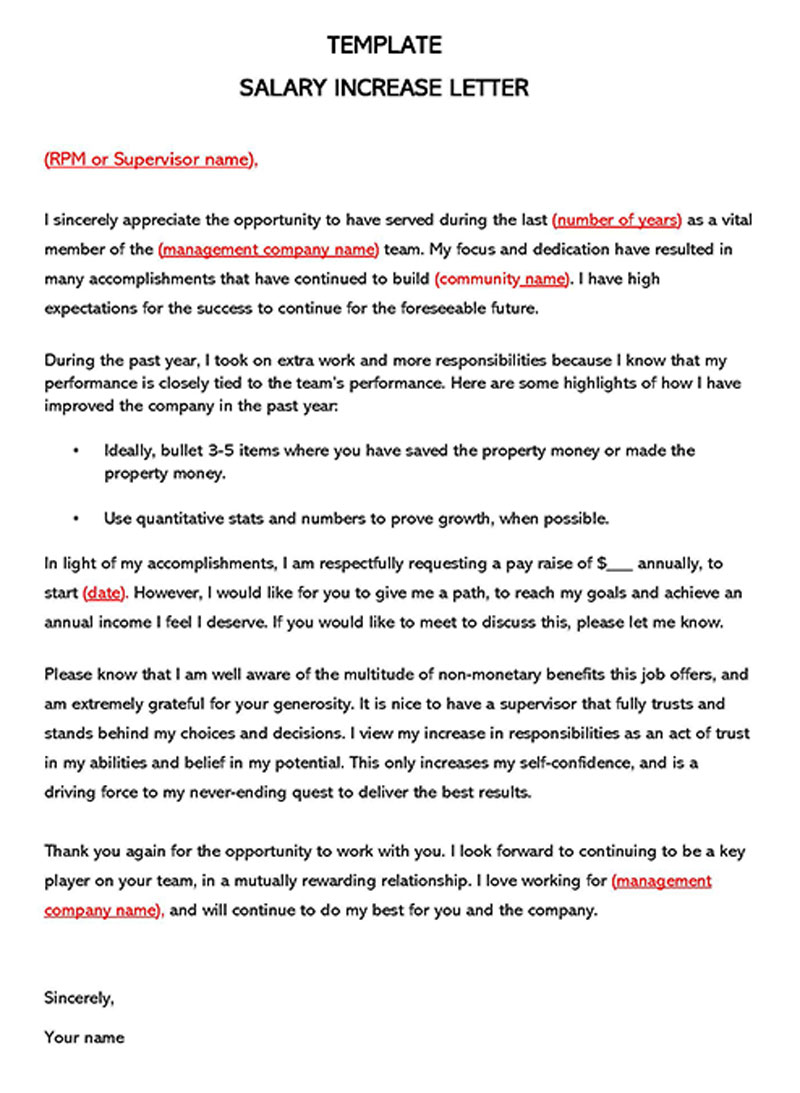
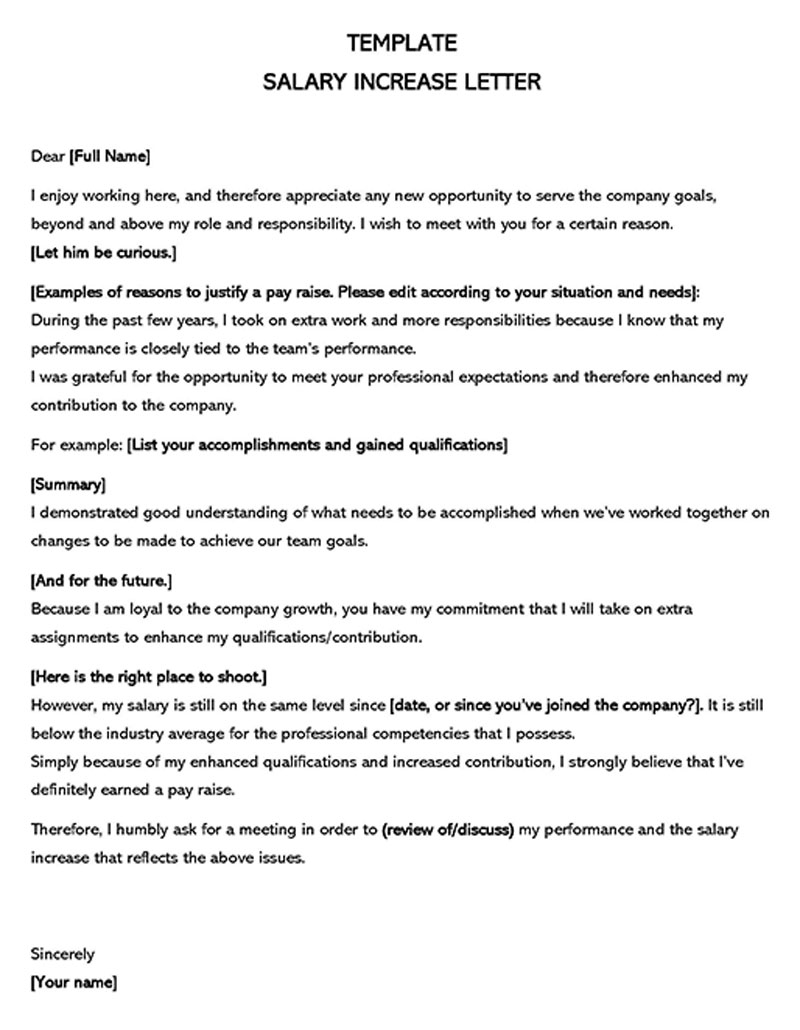
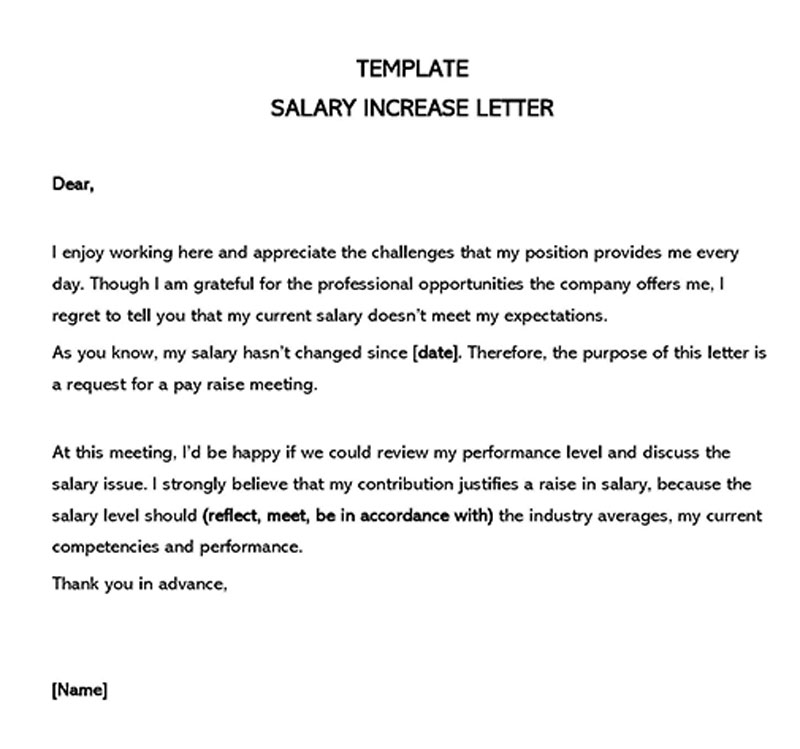
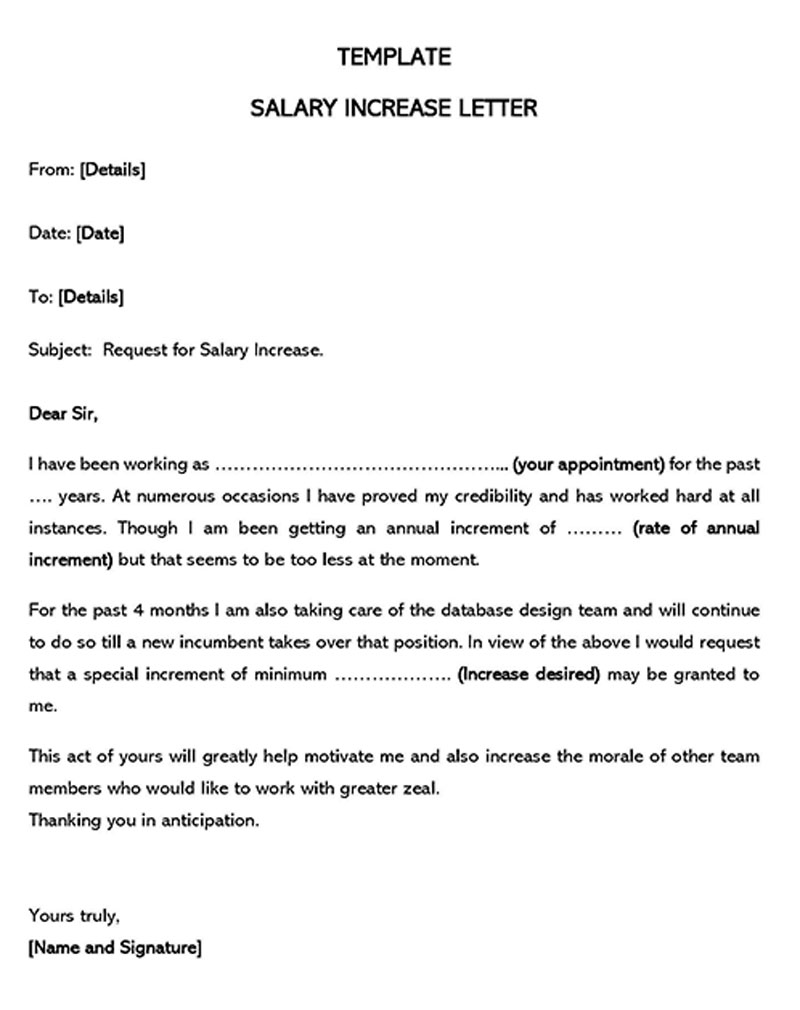
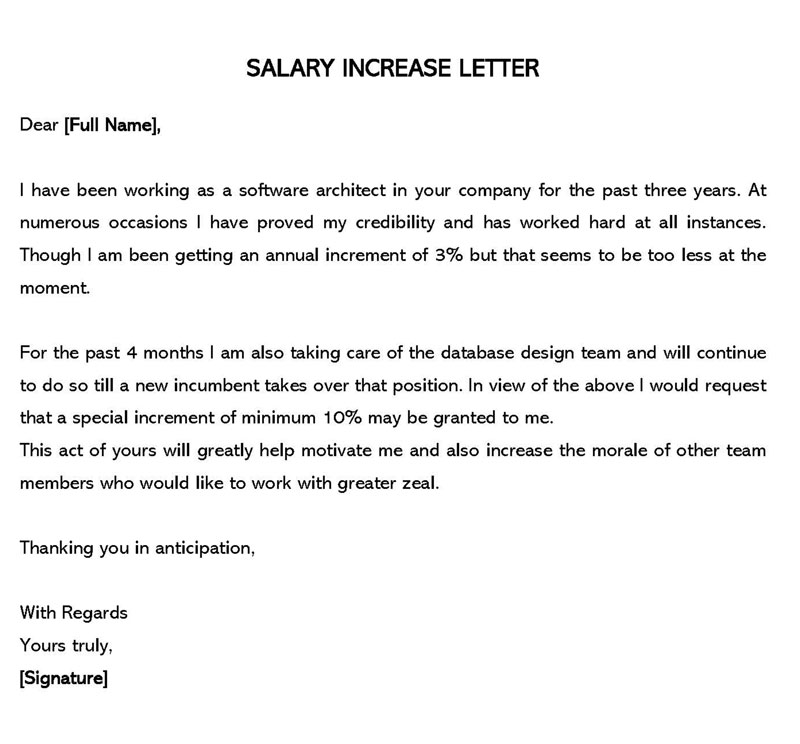
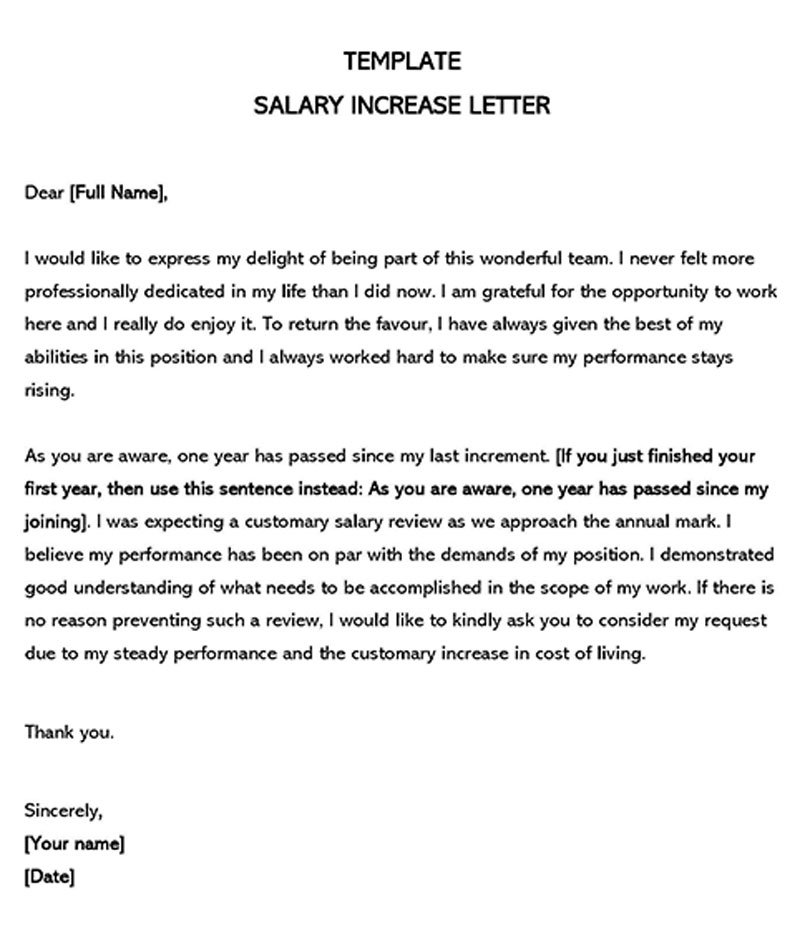
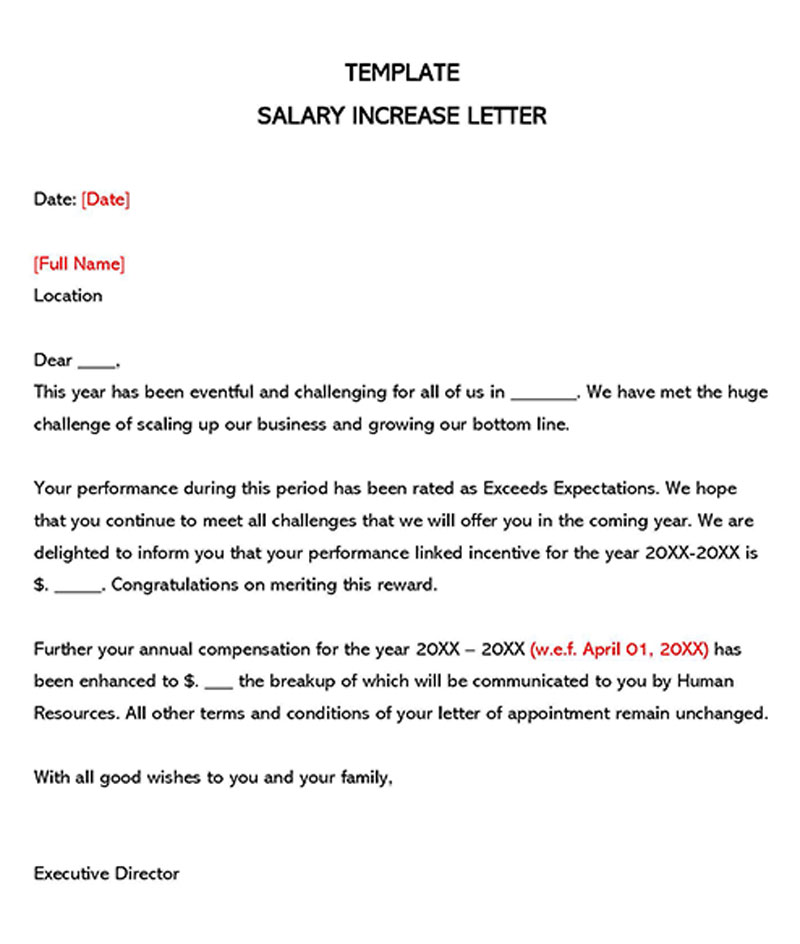
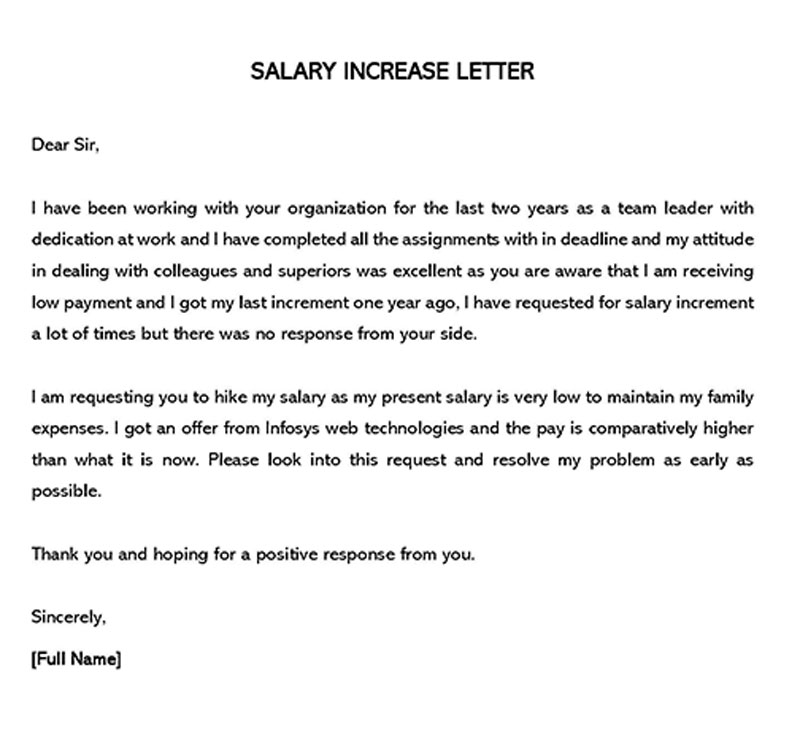
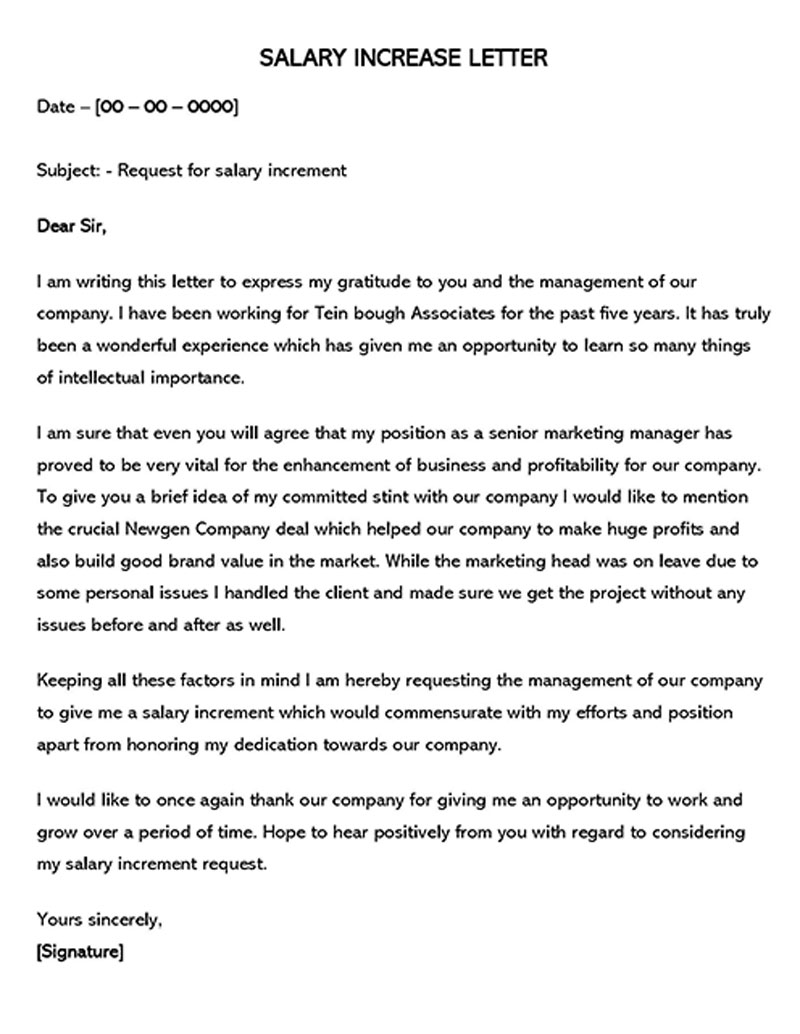
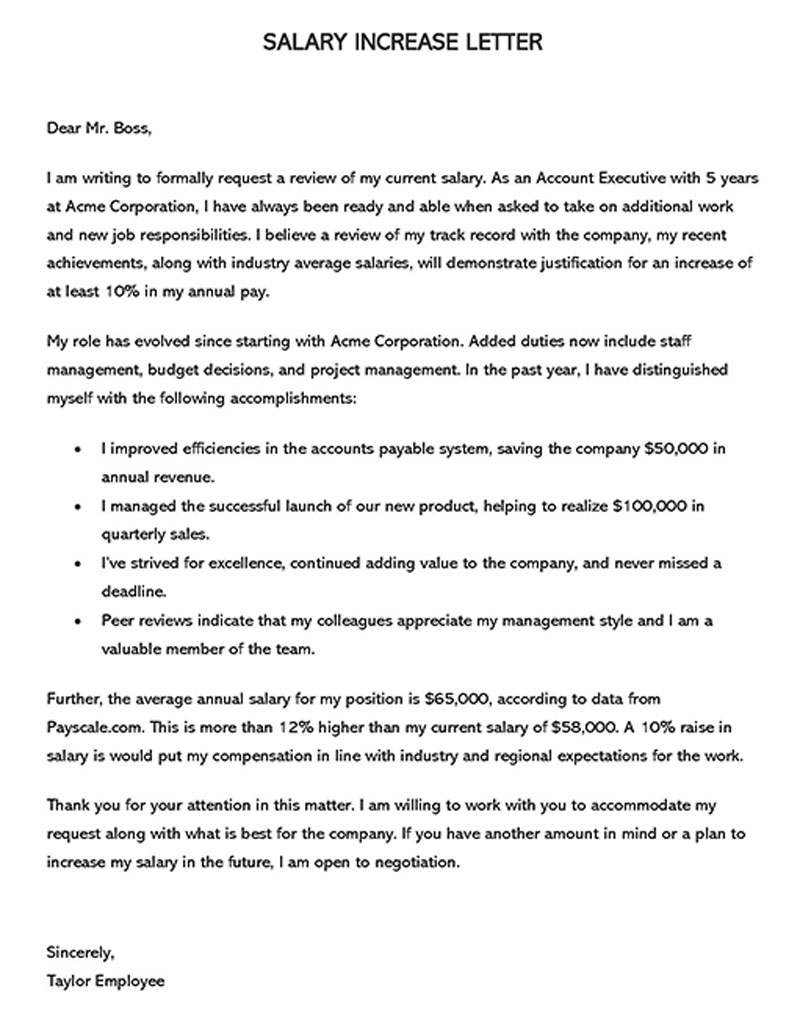
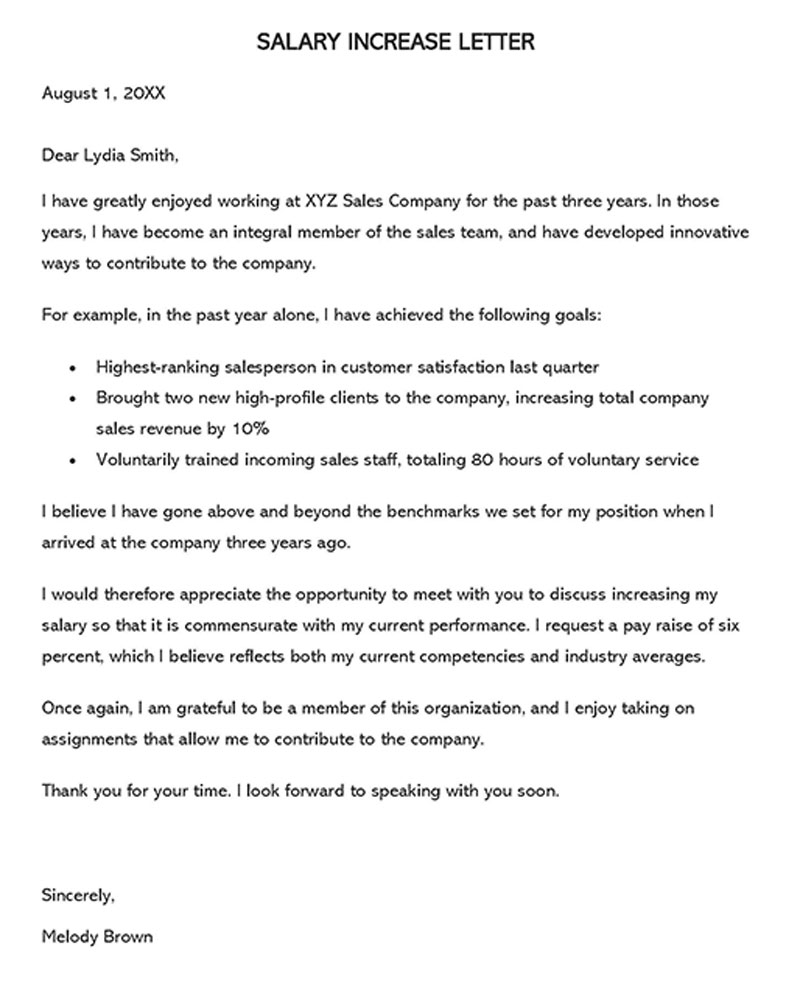
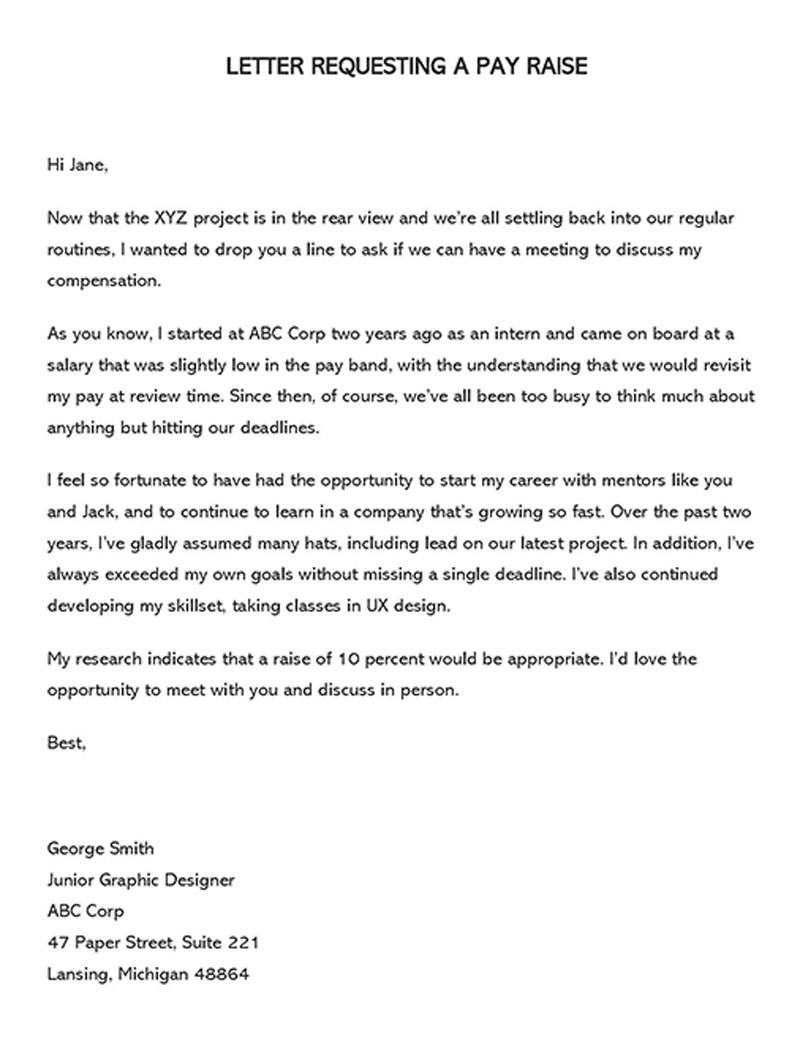
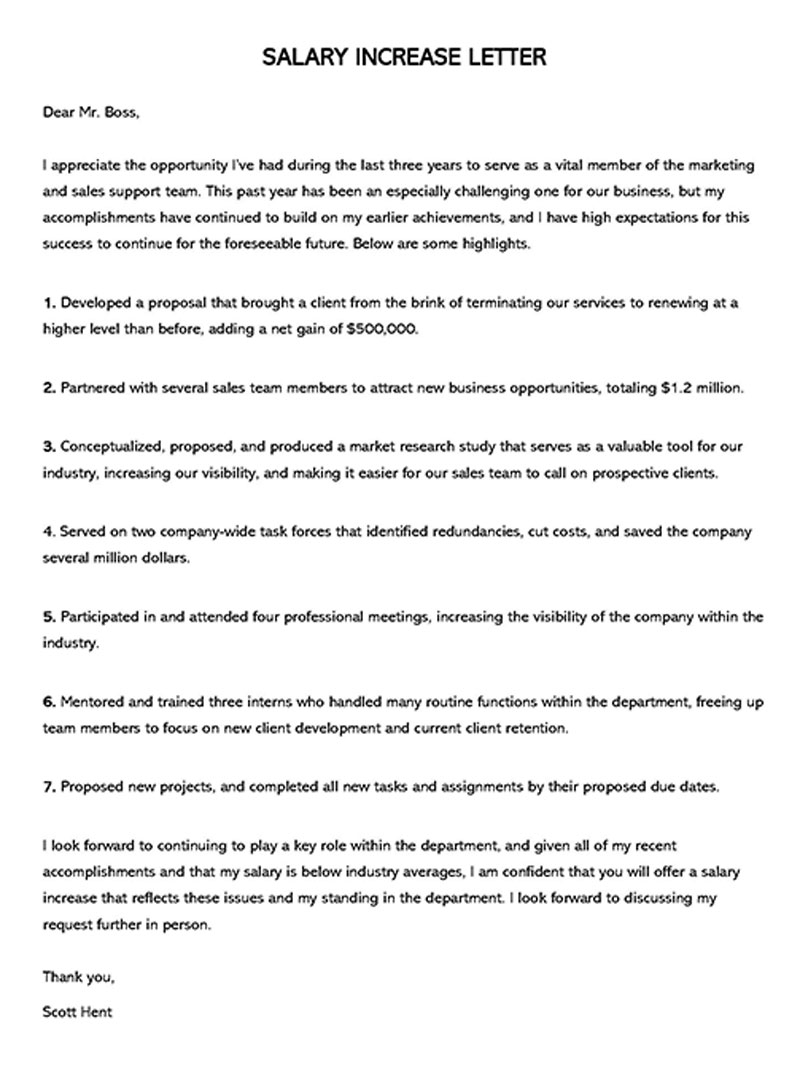
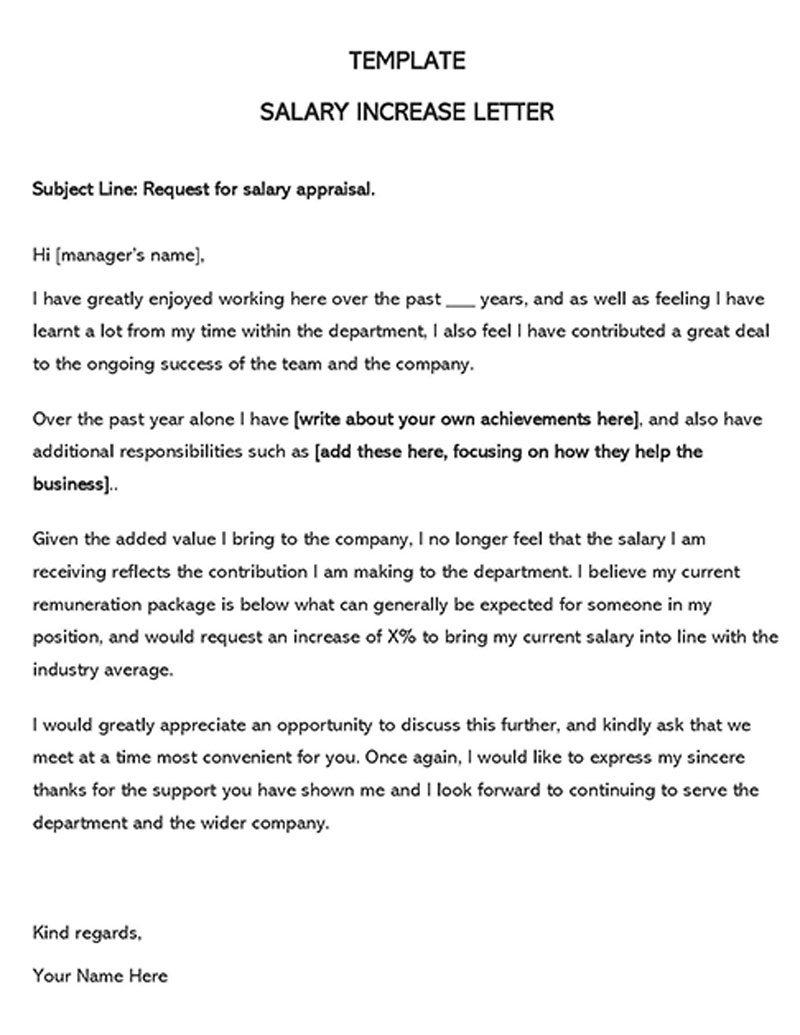
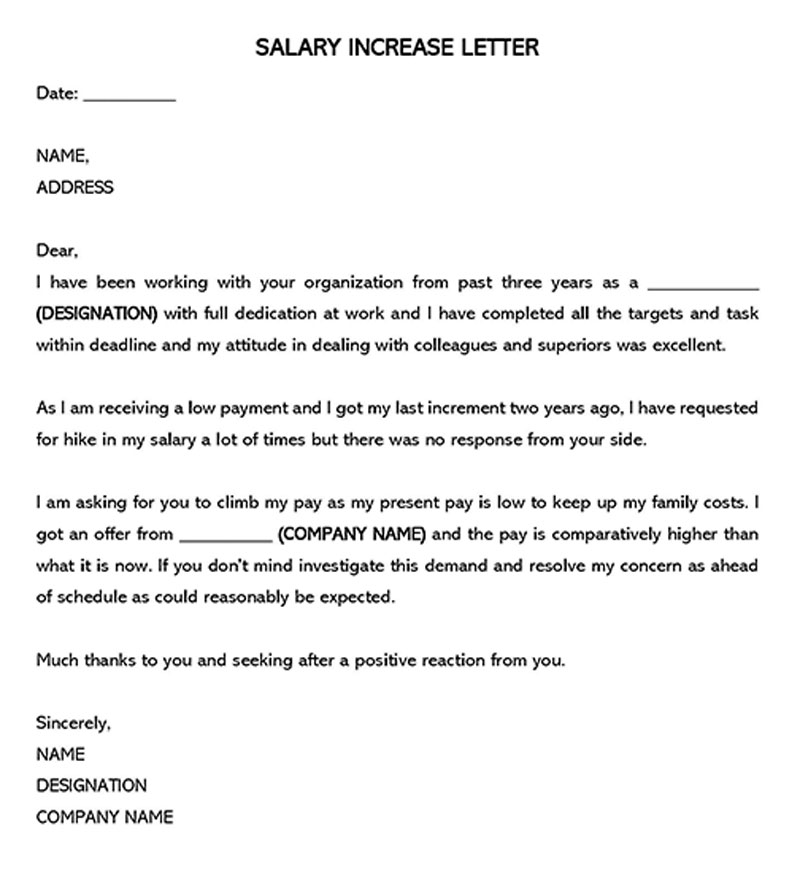
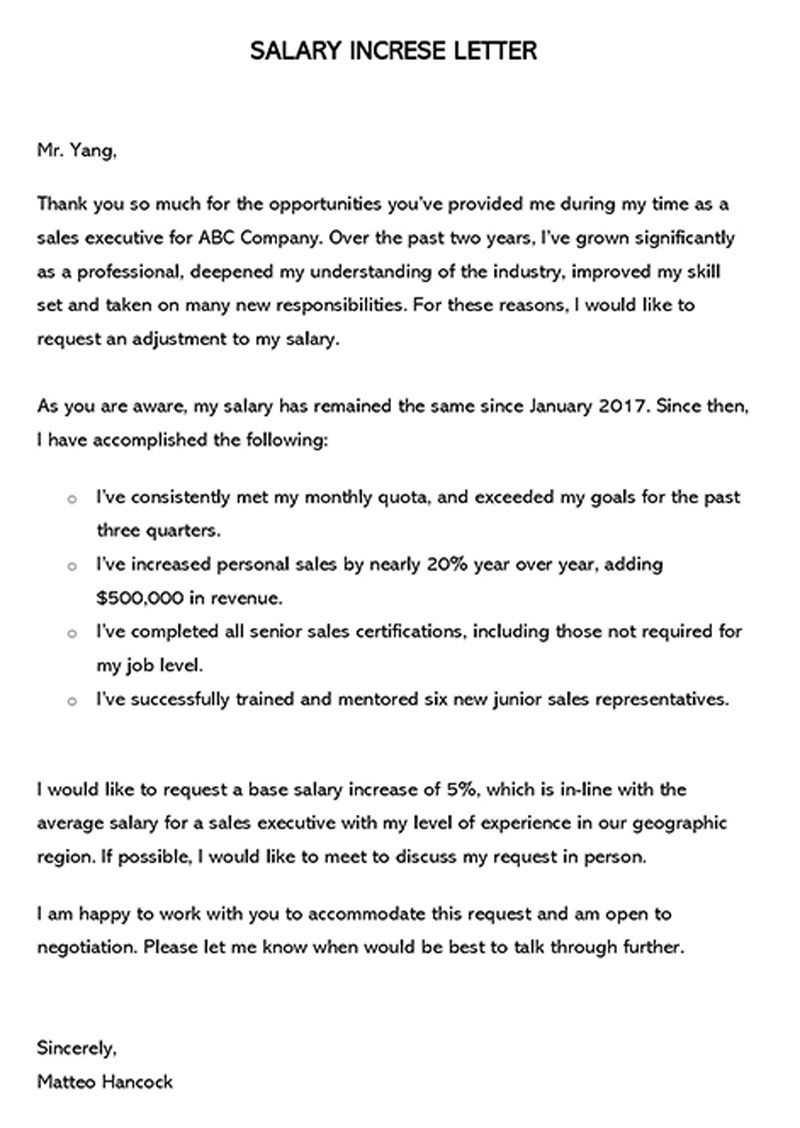
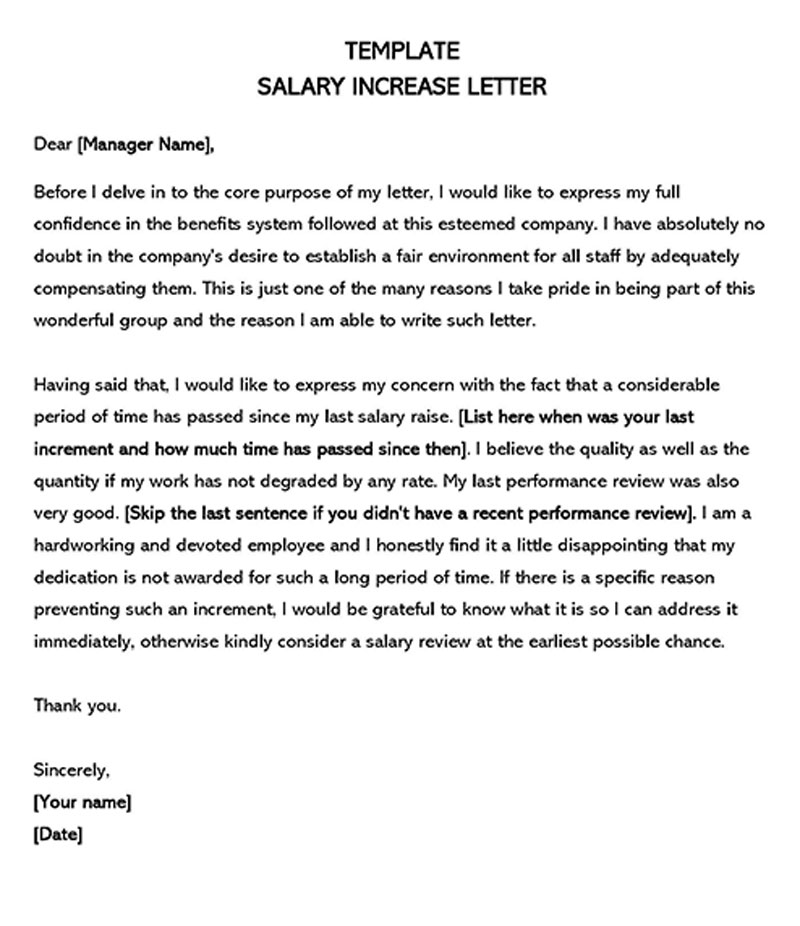
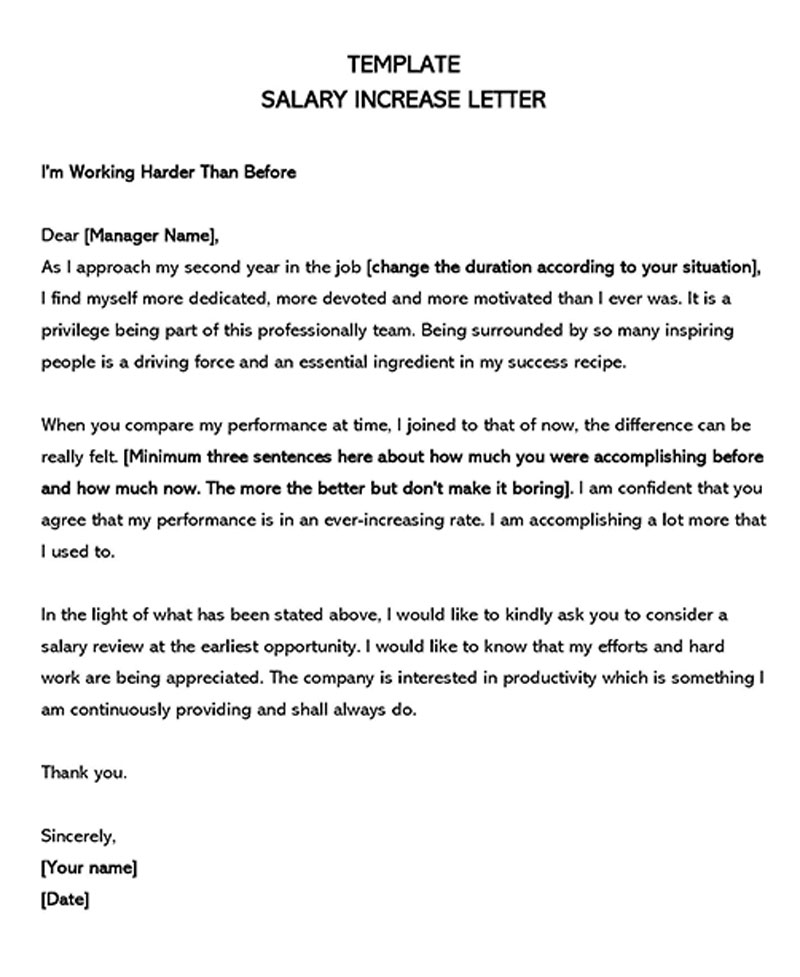
Benefits of Asking a Pay Raise in Writing
Though writing a letter may seem tedious, it is usually the best alternative. Some benefits of using a letter to convey your message to your employer include:
Both parties will feel more comfortable
Writing it puts you in a less awkward situation with your boss than discussing it upfront without a prior letter to notify your employer about your request. As a result, there is less nervousness as you give your reasons and your employers feel less pressure.
Formal documentation
Asking for the pay increase via a letter proves the document to be of formal origin, certifying it is taken seriously. In addition, putting it in a formal letter format formalizes the request before taking it up casually with your boss by discussing it with them face to face.
It’s helpful to organize your thoughts
In a letter, you can quickly sum up all your ideas with more convincing reasons why you deserve a pay raise than talking to your employer about it. With nervousness comes stuttering and forgetting the essential points you think are valid reasons for a pay raise. Presenting your request in letter format helps you assemble your thoughts and strong points.
Who to Send?
Although different ethics work for various organizations and businesses, the letter should be addressed to whoever is responsible for directly paying you or giving you additional bonuses. This person may be your direct manager, department head, or another person. If you are unsure who is responsible, you should find out.
Nevertheless, it should never be addressed directly to the employer, unless you work directly with the organization’s director. Sometimes, directing your letter to the top employer may ruin your chances of being considered for a pay raise. Also, this may come off as unprofessional to a lot of people.
When should I ask for a pay raise?
Recognizing the right time to ask for an increase is as important as putting up a reasonable request for a raise. If you want your request answered in affirmation, the right timing is critical.
Here are some possible situations in which you can send the letter:
When it is less than its market value
If, after thorough research, you observe you are underpaid, you should immediately ask for a pay raise. Use legitimate resources like Salary.com and so on to back up your claim.
When the company is in excellent financial condition
There can never be a better moment to chip in a letter than when the organization is reaping bountiful profits.
After improving your skills and qualifications
Suppose you have recently finished a new high-paying skill that helps your role or earned a higher qualification while on the job. It would be best to let your employer know about your recent achievement and send it.
When you’ve completed a large project
If you, alone or with a team, have completed and sealed off a big project/task, that’s a good time to ask for a pay raise.
When you are given more responsibilities
If your title and job description haven’t changed and more work has been added, you should consider writing the letter.
After a year from the last raise
Most organizations have made it a ritual to consider an increase in the pay raise of their employees during a given period every year. Harnessing this opportunity will likely yield a positive response from your employers without you appearing too keen for a raise.
After a performance review
When employees’ performances in your organization are being evaluated and fall into the good books, this may be the perfect time to send the letter.
note
It is unwise to ask for a pay raise if the organization is battling a severe financial crisis or laying off staff to remain afloat and in operation. Also, requesting frequently will hinder your future chances of being considered for a raise, even when you deserve one. Therefore, always play smart when sending it.
How to Write the Letter
Like the draft of every official letter, it will contain similar sections, the difference being the purpose of writing. Therefore, an official letter should include a header, introduction, body, and concluding sections.
These sections are further explained below:
Header
The header should include the following information:
Date
The letter’s current date should be written at the top of the letter in the header bar.
Your name, job description, and contact
Your full name, job description in the organization, telephone number, and additional addresses, if necessary, should be written in full at the top of the letter.
Employer’s name, job title, and contact
The name of your boss, manager, or any other person you are addressing the letter to should be written. In addition, their job titles and offices, contact information, and social media handles may be added.
Subject title
A short title capturing your reason for writing the letter should be written. This title should be specific and to the point.
Greetings
Keep your salutations as brief and as professional as possible, keeping in mind that this is an official letter, even if there’s a healthy relationship between you and your employer.
Introduction
A clear, concise, and detailed short paragraph addressing your primary purpose of writing a letter to your employer should stay in the introductory section.
EXAMPLE
The purpose of this letter is for a salary raise.
Body
The body of the letter usually consists of the following information:
Give reasons for the increase
In asking for a raise, you need to convince your employer with reasons why he should consider your request for a pay raise. Start with valid reasons, which will be organized and thoughtfully written.
Your achievements and accomplishments
Adding your accomplishments to the letter will go a long way toward your request. These listed achievements should be much more recent, primarily those after your last pay raise.
The exact raise you want
Come clean on the total amount you want for the payment. Do proper holistic research on recognized sites to find out. Usually, raises may be given at a fixed level or as a percentage raise. Do not leave this to the judgment of your organization to solve.
Appreciate for considering your request
End the letter with a polite appreciation for considering your request. Appearing polite in your letter will play a huge role.
Conclusion
Your signature with a salutation is written at the bottom of the letter to show your alliance with the letter’s content. This is required in every formal letter.
Template and Sample
Letter Template
Using the template below, fill in the correct information and make minor tweaks to make your request letter serve its purpose.
template
[Your first and last names]
[Title and position in the organization]
[House address]
[Telephone, mail, and other addresses]
[Date]
[Employer’s first and last names]
[Title and position in the organization]
[Company’s address]
[Employer’s work phone number]
Subject: Letter to request a salary increase
Dear [employer’s name],
I am writing to request a raise in my present salary. As the [your job title] of [name of your organization], I have worked diligently, taking on additional duties and responsibilities. I believe, with a review of my performance in the company, the general average pay, and my recent achievements, the plea to have an increase to a salary of [the percentage of salary increase you deserve] will be justified.
I have worked hard in the past year, improving my skills to accomplish numerous feats for [name of your company]. I’ve made a list to highlight a few of my recent responsibilities and accomplishments, which include the following:
I have displayed excellence and have constantly delivered top-notch whenever it was demanded. With these qualities, my workforce can count on me to deliver excellently as always.
In addition, the annual average salary of persons in my position according to [a legitimate, recognized source of your future salary claim] is [proposed salary], which is [percentage difference between the two salaries] higher than my current salary. Therefore, a [proposed percentage increase] rise in my salary will further encourage me to put in my best for the company’s growth.
I appreciate your attention to my request. I’ll be grateful if this is met with a positive response. If you have another percentage in mind to pay me, I remain open to negotiations.
Sincerely,
[Your name]
Letter Samples
You will find two sample salary review request letters below, providing a practical starting point for seeking guidance on how to approach this important aspect of professional communication.
sample 01
Dear Ms. Smith,
I am writing to request a review of my current salary. As a dedicated member of Innovatech Solutions for the past three years, I have earnestly endeavored to contribute to our team’s success, consistently going beyond my job responsibilities.
My tenure here has been marked by significant contributions to our data analysis processes, leading to a 20% increase in operational efficiency. Additionally, I played a key role in the successful launch of our flagship product last year, which has since generated a 30% increase in revenue. I have also pursued professional development opportunities, acquiring a certification in Advanced Data Analytics, to add further value to our team.
In light of these contributions and in consideration of industry standards, I kindly request a meeting to discuss a salary adjustment commensurate with my current role and contributions.
Thank you for your time and consideration. I am committed to our team’s ongoing success and look forward to continuing my growth and contributions at Innovatech Solutions.
Sincerely,
John Doe
sample 02
Dear Ms. Smith,
I hope this letter finds you well. I am writing to initiate a conversation regarding my current compensation package. Having been a part of Innovatech Solutions for over three years, I have taken pride in aligning my efforts with the company’s strategic goals and consistently delivering exceptional results.
My contributions, including streamlining our client data management system, which enhanced client satisfaction by 25%, have not only advanced our team’s objectives but have also been pivotal in securing several high-profile contracts. Additionally, I have kept pace with industry trends and standards, enhancing my skill set in project management and leadership.
Considering my ongoing contributions and the prevailing market rates for similar roles, I believe a discussion regarding a salary revision would be mutually beneficial. I request a meeting at your earliest convenience to discuss this matter further.
I appreciate your attention to this matter and am eager to continue contributing to our collective success at Innovatech Solutions.
Respectfully,
John Doe
Key Takeaways
These two letters are useful examples to follow when writing a request for a salary review for several reasons:
- Both letters maintain a professional and respectful tone. They open with a polite greeting and close with a courteous sign-off. This approach ensures the conversation starts on a positive note, reflecting professionalism and respect.
- Each letter clearly states its purpose from the beginning: a request for a salary review. This clarity helps the recipient understand the intent without having to sift through unnecessary details.
- Both letters effectively highlight the writer’s contributions to the company. The first letter mentions a 20% increase in operational efficiency and a significant role in a product launch that boosted revenue by 30%, along with professional development efforts. The second letter emphasizes enhanced client satisfaction and securing high-profile contracts. These specific examples demonstrate the writer’s value to the company and justify the request for a salary review.
- The letters show an understanding of and alignment with the company’s objectives. By linking personal achievements to the company’s success, the writer demonstrates a team-centric mindset, which is more likely to resonate with the employer.
- Both writers mention industry standards, suggesting that their requests are not just based on personal desires but are also grounded in market realities. This approach shows that they are informed and reasonable in their request.
- Rather than outright demanding a pay raise, both letters ask for a meeting to discuss the matter. This approach is less confrontational and opens the door for a two-way conversation, which is more conducive to a positive outcome.
- The letters end with a reiteration of the writer’s commitment to the company. This forward-looking perspective assures the employer of the writer’s ongoing dedication and desire to contribute to the company’s success.
How do I ask it via email?
Due to technological advances, emails are now the primary source of communication in most offices. Therefore, minor tweaks should be made to keep the letter from being sent by mail.
These tweaks made are:
- You must remove all addresses and shorten the paragraphs you wrote on the hard copy letter.
- Keep your request concise and meaningful. There is no need to beat around the bush while sending an email.
- You must choose a subject line that captures the purpose of your request.
- Edit the letter and correct spelling errors. Also, send yourself a copy to check if the layout is still intact. If the content is well aligned, you can send a copy to your boss.
Dos and Don’ts
Knowing what to do and what you should never attempt will reduce the chances of that awkward moment you want to avoid.
Do’s
Here is a list of do’s that you should do while writing your letter:
Do your research
Before you present the letter to your boss, it is wise to research the present situation in the company, the organization’s capacity, and its salary scale. Then, make a comparison to other organizations with similar activities and structures.
Back it up with proof
To the best of your ability, explain how you came up with the salary you asked for. Your explanation in the letter should reflect your increasing results and values, the new responsibilities and goals you have achieved, and, most importantly, the average scale of individuals of your position and duties in other organizations.
Wait for the right time
Wait until it is the best time to send the increase letter. Be conversant with your organization’s finances, so you don’t ask for a raise at one of the wrong moments when the organization is merely staying afloat. Remember, the right timing is vital!
Don’ts
Here is a list of a few essential mistakes that you should avoid in your letter:
Hinting your financial condition
Even if you are going through a difficult situation with your finances, using this as an excuse may attract pity, but it is never a solid reason to be included in why you deserve a pay raise.
Discussing salaries of co-workers
The letter should serve the purpose for which it was created; to give more valid reasons why you deserve a pay raise. On no account should your colleague’s salary be used to bolster your point. It is unprofessional.
Complaining
The tone of your letter should be evaluated so never try to sound desperate for a raise by making unnecessary remarks in your letter. Instead, be considerate and wise in watching your tone as you write.
Discussing your company’s present financial condition
Your organization is yielding profits thousands of times, which does not mean they owe you a raise. Including a statement implying this may come off as being unprofessional.
Conclusion
No one says you can’t walk up straight to your boss to demand a pay raise. But if you want to keep your job and your demand to be taken seriously, writing a letter to request a pay raise is the best bet with the most positive responses.
With a beautifully crafted letter, there’s a full assurance that you will yield very positive responses every time you apply this guide to writing. In addition, the samples and template provided to help you write the letter so that your boss finds it difficult not to respond positively to your plea if of course, you deserve the raise.




